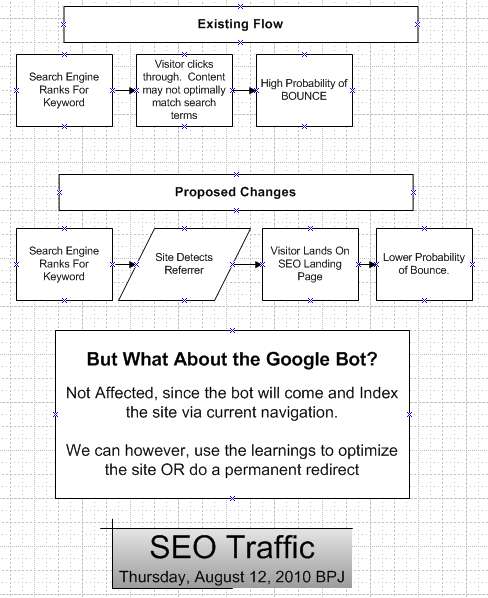
24 Aug SEO and a Fun Hypothesis for Attribution
Search Engine Optimization vs other models of online traffic generation has always had a seemingly bad rap on data reconciliation. Omniture SiteCatalyst and other analytics products have made the attribution easier by tracking search engine search keywords as variables through to key conversion points.
But until one gets an advanced analytics package implemented, here is a manual, yet simple model I’ve recently vetted to directly:
- Increase the ability to directly track search results
- Respond with content relevant to the search
- INCREASE a desired conversion or call to action
So without further brain spillage of thine keyboard…. What I am suggesting is a slight of the “hand” … a magical play…
So in a nut shell.
- One would use their current analytics package to identify highly visited SEO pages.
- One would analyze those pages for the match to SEO search keywords and see if the content for the frequency of keywords matches.
- One would “swap” out a page that better addresses the user’s needs
- One would simplify the landing page experience to one of an easier navigable experience with a cleaner path to call to action.
This helps, especially at the corporate/enterprise level, when multiple parties have to make decisions for core site initiatives.
It reduces the “clutter” and a page that has to presented in a certain way and allows the SEO team to directly measure the benefits of optimization initiatives.
The Technology Behind Making this Work….
This can be a simple function.
- For PHP driven sites on APACHE web servers, one would do a redirect based on the Google search URL string.
- To do this, use PHP to detect the referring URL.
- Once the referring URL is detected, then redirect the user to the strategic landing page.
- If you like, you could redirect to a url with custom dynamic analytic variables in the URL, which would track through the conversion to fully track and attribute the etiology of the traffic down to the keyword.
One would then measure and/ or improve the landing page experience via A/B and multivariate testing and proceed with best converting versions.
PLEASE NOTE: This should NOT affect the Search Engine spiders and bots, since the structure and navigation of the regular site will only be spidered through existing URLs.
The last step would be to influence web site executives to use the best practices that you found and implemented on the SEO landing pages on the regular site. While there may be some challenges on this influential tip, you will definitely have the data to make such a decision.
Good luck and let me know other ways in which you have experimented with this approach in economical ways.



No Comments